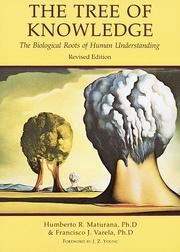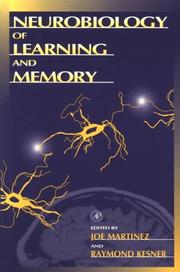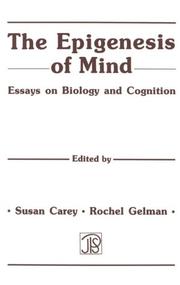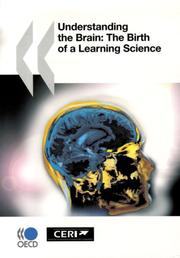| Listing 1 - 10 of 16 | << page >> |
Sort by
|
Book
ISBN: 1509050698 1509050701 9781509050697 Year: 2016 Publisher: Piscataway, New Jersey : IEEE,
Abstract | Keywords | Export | Availability | Bookmark
 Loading...
Loading...Choose an application
- Reference Manager
- EndNote
- RefWorks (Direct export to RefWorks)
Annotation Studying how intelligent biological and artificial systems develop sensorimotor, cognitive and social abilities, over extended periods of time, through dynamic interactions with their physical and social environments.
Developmental neurophysiology --- Epigenetics --- Learning Physiological aspects --- Robotics
Book
ISBN: 1908284773 Year: 2011 Publisher: New York : Management Pocketbooks,
Abstract | Keywords | Export | Availability | Bookmark
 Loading...
Loading...Choose an application
- Reference Manager
- EndNote
- RefWorks (Direct export to RefWorks)
Teachers are responsible for shaping the connections inside learners' brains on a day-to-day basis, connections that will remain in place for the rest of those learners' lives. Understanding the science of learning in the brain is, therefore, a powerful way to inform teaching and have an impact on learning. Furthermore, research evidence shows that teaching children about how the brain learns can improve their motivation to learn. So, when education writer and former teacher Richard Churches got together with two neuroscientists and a group of teachers they saw an exciting opportunity to pool
Brain. --- Effective teaching. --- Learning -- Physiological aspects. --- Learning, Psychology of.

ISBN: 0877736421 9780877736424 Year: 1998 Publisher: Boston: Shambhala,
Abstract | Keywords | Export | Availability | Bookmark
 Loading...
Loading...Choose an application
- Reference Manager
- EndNote
- RefWorks (Direct export to RefWorks)
Cognitive psychology --- Cognition --- Learning --- Neuropsychology --- Physiological aspects --- Cognition - Physiological aspects. --- Learning - Physiological aspects. --- Neuropsychology. --- Physiological aspects. --- Cognition - Physiological aspects --- Learning - Physiological aspects
Book
ISBN: 9781412997973 1412997976 Year: 2011 Publisher: Thousand Oaks: Corwin,
Abstract | Keywords | Export | Availability | Bookmark
 Loading...
Loading...Choose an application
- Reference Manager
- EndNote
- RefWorks (Direct export to RefWorks)
Cognitive psychology --- Learning, Psychology of --- Learning --- Brain --- Physiological aspects --- Learning - Physiological aspects

ISBN: 0124756557 9786611984052 1281984051 0080537405 9780124756557 9780080537405 9781281984050 6611984054 Year: 1998 Publisher: San Diego : Academic Press,
Abstract | Keywords | Export | Availability | Bookmark
 Loading...
Loading...Choose an application
- Reference Manager
- EndNote
- RefWorks (Direct export to RefWorks)
Neurobiology of Learning and Memory provides an excellent overview of current information on this fast-growing field of neurobiology. The contents have been structured for use as a course text or as a handy resource for researchers in neuro- and cognitive psychology. It discusses learning and memory from developmental, pharmacological, and psychobiological perspectives, as well as changes in learning and memory with age. Neurobiology of Learning and Memory also includes research on invertebrates and vertebrates, presenting basics in anatomy and development along with computationa
Learning --- Memory --- Neurobiology --- Physiological aspects --- Neurobiology. --- Physiological aspects. --- physiology. --- Physiology. --- Neurosciences --- Cognitive neuroscience --- Neuropsychology --- Learning - Physiological aspects --- Memory - Physiological aspects

ISBN: 2708117408 9782708117402 Year: 1997 Publisher: Paris: Éditions d'organisation,
Abstract | Keywords | Export | Availability | Bookmark
 Loading...
Loading...Choose an application
- Reference Manager
- EndNote
- RefWorks (Direct export to RefWorks)
Pédagogie Opvoedkunde --- Cerveau Hersenen --- Information (communication) Informatie (communicatie) --- Gestion des ressources humaines Personeelsbeleid --- Apprentissage Leerproces --- Didactique Didactiek --- #KVHA:Taalonderwijs Frans --- 616.8 --- neurologie --- Learning, Psychology of --- Learning --- Cognitive neuroscience --- Brain --- Physiological aspects --- #KVHA:Taalonderwijs; Frans --- Learning - Physiological aspects

ISBN: 0805804382 Year: 1991 Publisher: Hillsdale, N.J. Erlbaum
Abstract | Keywords | Export | Availability | Bookmark
 Loading...
Loading...Choose an application
- Reference Manager
- EndNote
- RefWorks (Direct export to RefWorks)
Cognitive psychology --- Biological anthropology. Palaeoanthropology --- Developmental psychology --- Cognition --- Knowledge, Theory of --- Learning, Psychology of --- Psychobiology --- Théorie de la connaissance --- Psychologie de l'apprentissage --- Psychobiologie --- Congresses --- Physiological aspects --- Congrès --- Cognition. --- Learning. --- Neuropsychology. --- -Cognition --- -Knowledge, Theory of --- -Learning, Psychology of --- -Psychobiology --- -Learning Physiological aspects --- -#PEDA *P 4.03 --- #PEDA *P 1.5 --- Biological psychology --- Biopsychology --- Biology --- Human behavior --- Psychology --- Biological psychiatry --- Learning --- Psychology of learning --- Educational psychology --- Comprehension --- Learning ability --- Epistemology --- Theory of knowledge --- Philosophy --- Neuropsychologies --- Neuropsychiatry --- Memory Training --- Phenomenography --- Training, Memory --- Memory Consolidation --- Education --- Cognitive Function --- Cognitions --- Cognitive Functions --- Function, Cognitive --- Functions, Cognitive --- -Congresses --- Psychological aspects --- Théorie de la connaissance --- Congrès --- Learning Physiological aspects --- Neuropsychology --- #PEDA *P 4.03 --- Physiological aspects&delete&
Book
ISBN: 9789264029149 9264029141 926402915X Year: 2007 Publisher: [Paris]: Organisation de coopération et de développement économiques,
Abstract | Keywords | Export | Availability | Bookmark
 Loading...
Loading...Choose an application
- Reference Manager
- EndNote
- RefWorks (Direct export to RefWorks)
Cet ouvrage est une lecture essentielle pour tous ceux que la question de l’éducation intéresse, qu’il s’agisse de parents, d’enseignants, d’apprenants ou de responsables politiques. Ce livre pourra confirmer et éclairer ce qu’ils savent déjà d’expérience, mais il ménage également des surprises. L’un des objectifs de Comprendre le cerveau est d’encourager le dialogue entre les éducateurs et les chercheurs en neurosciences. Il s’agit de voir ce que chacun peut apporter à l’étude du processus d’apprentissage. Un effort international et transdisciplinaire contribuera de manière décisive au traitement des problèmes récurrents dans le domaine de l’éducation.
Cognitive neuroscience --- Learning, Psychology of --- Learning --- Brain --- Neurosciences cognitives --- Psychologie de l'apprentissage --- Apprentissage --- Cerveau --- Physiological aspects --- Aspect physiologique --- Apprentissage Leerproces --- Cerveau Hersenen --- Méthodes d'enseignement Onderwijsmethoden --- Sciences Wetenschappen --- Cognitive neuroscience. --- Learning, Psychology of. --- Brain. --- Physiological aspects. --- Cerebrum --- Mind --- Central nervous system --- Head --- Neuropsychology --- Psychology of learning --- Educational psychology --- Comprehension --- Learning ability --- Cognitive neuropsychology --- Cognitive science --- Psychological aspects --- Learning - Physiological aspects

ISBN: 1281745774 9786611745776 9264029133 9264029125 Year: 2007 Publisher: Paris : OECD,
Abstract | Keywords | Export | Availability | Bookmark
 Loading...
Loading...Choose an application
- Reference Manager
- EndNote
- RefWorks (Direct export to RefWorks)
This book provides new insights about learning by synthesising existing and emerging findings from cognitive and brain science and exploring how this new information might impact teaching, parenting, and educational policy making. It shows what the latest brain imaging techniques and other advances in the neurosciences actually reveal about how the brain develops and operates at different stages in life from birth to old age and how the brain is involved in acquiring skills such as reading and counting. It also presents scientific insights into what happens when the brain malfunctions in conditions such as dyslexia or Alzheimer's disease. China Education Daily nominated this book as one of the "100 most influential education books for teachers" on December 15, 2011.
Brain. --- Cognitive neuroscience. --- Learning -- Physiological aspects. --- Learning, Psychology of. --- Cognitive neuroscience --- Learning, Psychology of --- Learning --- Brain --- Human Anatomy & Physiology --- Neuroscience --- Health & Biological Sciences --- Physiological aspects --- Physiological aspects. --- Cerebrum --- Mind --- Psychology of learning --- Cognitive neuropsychology --- Psychological aspects --- Central nervous system --- Head --- Neuropsychology --- Educational psychology --- Comprehension --- Learning ability --- Cognitive science
Book
ISBN: 9782738151506 2738151507 Year: 2020 Publisher: Paris: Odile Jacob,
Abstract | Keywords | Export | Availability | Bookmark
 Loading...
Loading...Choose an application
- Reference Manager
- EndNote
- RefWorks (Direct export to RefWorks)
"S’appuyant sur plus d’une centaine d’études fascinantes sur le cerveau et l’apprentissage, ce livre vous explique comment tirer profit de 7 principes simples pour apprendre de manière durable et efficace. Les élèves et les étudiants y trouveront des pistes précieuses pour mieux réussir à l’école ou à l’université ; les parents, une méthode claire pour accompagner leurs enfants dans leurs apprentissages ; les adultes, des solutions utiles pour améliorer leurs performances. Quant aux enseignants et aux formateurs, ils y découvriront des stratégies précises pour leurs cours ou leurs programmes. Apprendre et enseigner : les 7 principes neuroéducatifs pour l’école, le travail et la maison. Le livre de neuroéducation qui allie rigueur scientifique et mise en application concrète."
Brain --- Cognitive psychology --- Learning, Psychology of --- Cognitive neuroscience --- Motivation in education --- Psychologie de l'apprentissage. --- Cerveau. --- Psychologie cognitive. --- Neurosciences cognitives. --- Motivation en éducation. --- Apprentissage Leerproces --- Cerveau Hersenen --- Cognitive Neuroscience --- Cognitive Therapy --- Psychology --- Educational psychology --- Learning --- Physiological aspects --- Learning - Physiological aspects --- Apprentissage cognitif --- Cognitive learning. --- Cognitive neuroscience.
| Listing 1 - 10 of 16 | << page >> |
Sort by
|

 Search
Search Feedback
Feedback About UniCat
About UniCat  Help
Help News
News